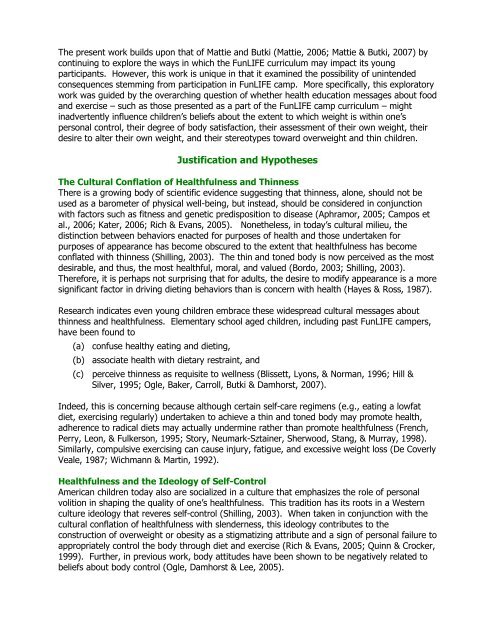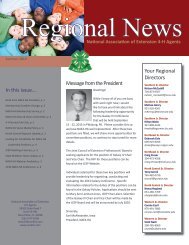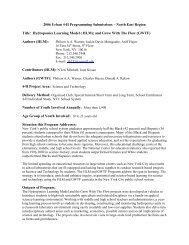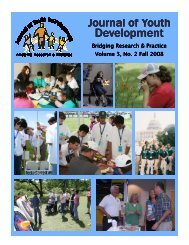Winter 2008 - Vol. 3 No. 3 - National Association of Extension 4-H ...
Winter 2008 - Vol. 3 No. 3 - National Association of Extension 4-H ...
Winter 2008 - Vol. 3 No. 3 - National Association of Extension 4-H ...
- No tags were found...
You also want an ePaper? Increase the reach of your titles
YUMPU automatically turns print PDFs into web optimized ePapers that Google loves.
The present work builds upon that <strong>of</strong> Mattie and Butki (Mattie, 2006; Mattie & Butki, 2007) bycontinuing to explore the ways in which the FunLIFE curriculum may impact its youngparticipants. However, this work is unique in that it examined the possibility <strong>of</strong> unintendedconsequences stemming from participation in FunLIFE camp. More specifically, this exploratorywork was guided by the overarching question <strong>of</strong> whether health education messages about foodand exercise – such as those presented as a part <strong>of</strong> the FunLIFE camp curriculum – mightinadvertently influence children’s beliefs about the extent to which weight is within one’spersonal control, their degree <strong>of</strong> body satisfaction, their assessment <strong>of</strong> their own weight, theirdesire to alter their own weight, and their stereotypes toward overweight and thin children.Justification and HypothesesThe Cultural Conflation <strong>of</strong> Healthfulness and ThinnessThere is a growing body <strong>of</strong> scientific evidence suggesting that thinness, alone, should not beused as a barometer <strong>of</strong> physical well-being, but instead, should be considered in conjunctionwith factors such as fitness and genetic predisposition to disease (Aphramor, 2005; Campos etal., 2006; Kater, 2006; Rich & Evans, 2005). <strong>No</strong>netheless, in today’s cultural milieu, thedistinction between behaviors enacted for purposes <strong>of</strong> health and those undertaken forpurposes <strong>of</strong> appearance has become obscured to the extent that healthfulness has becomeconflated with thinness (Shilling, 2003). The thin and toned body is now perceived as the mostdesirable, and thus, the most healthful, moral, and valued (Bordo, 2003; Shilling, 2003).Therefore, it is perhaps not surprising that for adults, the desire to modify appearance is a moresignificant factor in driving dieting behaviors than is concern with health (Hayes & Ross, 1987).Research indicates even young children embrace these widespread cultural messages aboutthinness and healthfulness. Elementary school aged children, including past FunLIFE campers,have been found to(a) confuse healthy eating and dieting,(b) associate health with dietary restraint, and(c) perceive thinness as requisite to wellness (Blissett, Lyons, & <strong>No</strong>rman, 1996; Hill &Silver, 1995; Ogle, Baker, Carroll, Butki & Damhorst, 2007).Indeed, this is concerning because although certain self-care regimens (e.g., eating a lowfatdiet, exercising regularly) undertaken to achieve a thin and toned body may promote health,adherence to radical diets may actually undermine rather than promote healthfulness (French,Perry, Leon, & Fulkerson, 1995; Story, Neumark-Sztainer, Sherwood, Stang, & Murray, 1998).Similarly, compulsive exercising can cause injury, fatigue, and excessive weight loss (De CoverlyVeale, 1987; Wichmann & Martin, 1992).Healthfulness and the Ideology <strong>of</strong> Self-ControlAmerican children today also are socialized in a culture that emphasizes the role <strong>of</strong> personalvolition in shaping the quality <strong>of</strong> one’s healthfulness. This tradition has its roots in a Westernculture ideology that reveres self-control (Shilling, 2003). When taken in conjunction with thecultural conflation <strong>of</strong> healthfulness with slenderness, this ideology contributes to theconstruction <strong>of</strong> overweight or obesity as a stigmatizing attribute and a sign <strong>of</strong> personal failure toappropriately control the body through diet and exercise (Rich & Evans, 2005; Quinn & Crocker,1999). Further, in previous work, body attitudes have been shown to be negatively related tobeliefs about body control (Ogle, Damhorst & Lee, 2005).






